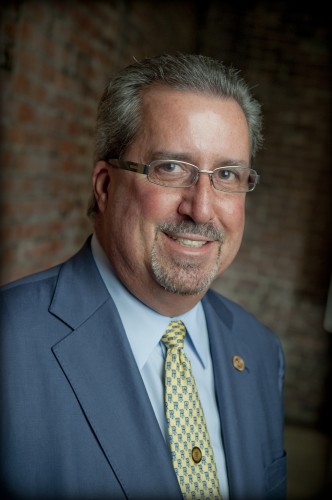
Ronald P. Jordan, R. Ph., FAPhA, has been named founding dean of Chapman University’s new School of Pharmacy.
Ronald P. Jordan, R. Ph., FAPhA, has been named founding dean of Chapman University’s new School of Pharmacy, which is planning to admit its first class in fall 2015. Jordan will assume his new duties at Chapman in February 2013 and will establish the first pharmacy school in Orange County on Chapman’s new Health Sciences Campus in Irvine when renovations are completed this year.
Jordan previously served as dean of the College of Pharmacy at the
University of Rhode Island
and as executive secretary of the
Rhode Island State Crime Lab Commission
. At URI, he oversaw completion of construction on his college’s $75 million research and teaching facility. During his tenure at URI, enrollment in the pharmacy program increased 45 percent. The URI College of Pharmacy ranked among the top research-oriented colleges of pharmacy in the U.S., with federally funded research exceeding a five-year average of nearly $9 million per year, a one-third period-to-period increase.
“Dean Jordan comes to Chapman with a distinguished background in his profession, and with a remarkable record of innovation and leadership in the interdisciplinary development of health professionals, and pharmacists in particular,” said Daniele Struppa, Ph.D., chancellor of Chapman University. “Under Dean Jordan’s aegis we intend to educate the new generation of pharmacists – a profession that is in extremely high demand in California and nationwide – with training in the newest and most vital areas of expertise, including genetics and personalized medicine, biologics, biopharmaceuticals, and the very latest in medication and care delivery. He is an accomplished entrepreneur as well as a pharmacy leader, with both business development and health informatics expertise. We are very excited to have Dean Jordan on board as Chapman embarks on this next phase of our Health Sciences initiative.”
Chapman’s Health Sciences Campus, purchased in 2012 for $20 million, is comprised of two large former research-and-development buildings in the Irvine Spectrum. The new campus provides Chapman with 166,000 square feet of space and ample parking, which will allow the university to significantly expand its multi-disciplinary health sciences programs. Chapman will invest another $24 million in renovations to the buildings to accommodate its health science classes, which will include the physical therapy doctoral program, one of the nation’s oldest and most respected, and the new School of Pharmacy. Chancellor Struppa said that more programs will be added later, including a physician’s assistant program, “always with an eye to which health fields are in most demand in California and throughout the U.S.”
“I look forward to guiding Chapman’s new School of Pharmacy,” said Jordan. “Its location in Irvine, among a constellation of biopharmaceutical and medical-device industry innovators, represents a unique opportunity for potential industry collaboration and professional development. Pharmacists practicing in the very near future will face challenges in medication management and delivery that are impossible to envision clearly today. The next-generation drugs are biologics, made by actual living cells rather than synthesis with chemicals like many of today’s medicines. By 2014, six of the top ten drugs used in the U.S. will be biologics. Our future pharmacists will need to be the expert sources of deep scientific knowledge on how these drugs work. Our school will train these professionals to interpret and put into practice the massive amount of data generated on this subject, preparing them for a continually changing profession whose boundaries are growing almost day by day.”
Chapman is uniquely positioned to become a significant partner with these industries, Jordan explained. He added that Chapman’s School of Pharmacy will interact with and benefit from the other developing and current health professional training programs to be housed on the new campus in Irvine, and the university’s other science programs on the main campus. “We’ll be able to capitalize on the highly qualified faculty and the current work in health professions training, health informatics and biological sciences being carried out in Irvine and in Orange.”
Under Jordan’s leadership, the University of Rhode Island’s College of Pharmacy was awarded one of the federal government’s highly competitive Center for Medicaid and Medicare Innovation grants, totaling more than $14 million over three years. He serves on executive advisory boards for that grant. He also helped establish a new bachelor of science in pharmaceutical sciences program in the college, and oversaw the advancement of graduate research program funding as well as global research and education partnerships. He also increased fund-raising for the college by 50 percent.
Before coming to URI, Jordan founded businesses in hospice and pain management pharmacy, health benefit management software and integrated health systems informatics consulting. He also served as a senior executive at companies offering such products as an online consumer prescription marketplace, a pharmaceutical product supply chain transformation tools, and insurance through a major national health benefits firm.
Jordan earned his bachelor of science in pharmacy at URI in 1976, and studied for three years in a doctoral program in pharmaceutics. He is a former president of the American Pharmacists Association (APhA), a fellow of the APhA Academy of Pharmacy Practice, a member of the American Association of Colleges of Pharmacy, and served as trustee and standardization chairman of the National Council for Prescription Drug Programs (NCPDP). He was instrumental in developing the pharmacy profession’s current patient-centered medication therapy management standards, as well as the health informatics standards that form the foundation of prescription benefit coverage and administration. He led NCPDP’s effort to gain American National Standards Institute approval of operating procedures for consensus standards development in pharmacy.
Jordan currently serves on the U.S. Pharmacopeial Convention Medicare Model Guidelines Expert Panel, and the national advisory committee for the Alliance for Safe Biological Medicines. He previously served as one of two pharmacists on the Health Care Financing Administration’s Medicare Coverage Advisory Committee Panel on “Prescription Drugs, Biologicals and Therapeutics.” He was appointed to the RI Governor’s Advisory Council on Health from 1997 to 2005, designed and implemented the Rhode Island Pharmaceutical Assistance to the Elderly (RIPAE), and served as subcommittee chair on the American National Standards Institute’s Health Informatics Standards Board, which provided the early framework for the Health Insurance Portability and Accountability Act (HIPAA).
Chapman Newsroom
Main Menu >
Media Contacts
Office of Public Relations
PR@chapman.edu
Strategic Marketing and Communications
1 University Drive
Orange, CA 92866
Contact Us
Strategic Marketing and Communications
1 University Drive
Orange, CA 92866
Contact Us
Newsroom Site
Your Header Sidebar area is currently empty. Hurry up and add some widgets.




This rush to open more pharmacy schools – ridiculous here being in Southern California where there are already so many – is only contributing to the suffering of pharmacy graduates who are already finding it a difficult job market. Let this be a lesson to people who think of colleges as some sort of enlightened and selfless institutions – they can be just as greedy as anything else and are sometimes even worse because they disguises themselves as ethically incorrigible.
Dear Mike,
Thank you for providing your comments. I appreciate receiving them and write today in reply. Chapman University began pursuing a School of Pharmacy, abbreviated CUSP, in late 2011. We initially were partnered with a graduate institute in the Inland Empire, though Chapman’s desire was to have the first School of Pharmacy in Orange County where there are currently no schools and a population of more than 3 million people. You might be interested to know that Orange County supplies more applicants to pharmacy schools nationwide than any other county in the country and that for years California has exported pharmacy school applicants.
Your statements about applicant demand in Southern California run contrary to the statistics on applicant demand. Furthermore, well-established experts in pharmacy practice foresee a significant demand for graduates equipped with advanced primary care and team care skill sets. Witness the “provider status” efforts moving through the California legislature. We have letters of support for our school from two large local health organizations, one the largest employer of pharmacists in Orange County. Both predict additional demand for pharmacists in the future. CUSP’s mission is to graduate pharmacists with skills that include and extend beyond the traditional practice environments encountered now in order to meet the needs of an evolving healthcare landscape. We plan to position our graduates for employment in evolving areas of practice in the local industry, care management, advanced primary care and for additional post-doc specialty training.
As you suggest, the purpose of higher education is really to prepare students for the workforce. Here at Chapman we also believe we prepare our students to be contributing global citizens. We also believe that universities actually prepare students for a lifetime of learning that will enable them to do jobs that one can’t even envision today. Thinking back on the changes we all have seen, what university could have predicted preparing students for some of the jobs that are so prevalent today. To a great extent, this is what we predict for pharmacy. While the economic downturn did limit some traditional practice community and institutional jobs, employers tell us that indications are this will change as the economy improves. In addition, there has always been strong demand for pharmacists with skills transferable into the pharmaceutical, biopharmaceutical and medical device industries locally. The future surely holds enormous opportunity for pharmacists as more people get access to health care through government health reform programs and as the health delivery industry restructures to deliver more efficient and higher quality care.
I also firmly believe that there are still too many errors in health care delivery and that pharmacists are positioned to lead efforts in error prevention, improved quality, decreased health costs and the development of a “flawless” health delivery system. The costs and damage from medication-related error is all too common today. The IOM and many other experts agree with this need to focus on quality improvement and error prevention. CUSP will focus on these areas.
My hope is that CUSP will ultimately be of great assistance to all pharmacists and pharmacy graduates in our area who seek an expanding role in helping people become and stay healthier, especially by ensuring that their medication use is flawless. We intend to work with and provide training and support to pharmacists and health care provider organizations within our county and beyond.
Thank you for your interest in the Chapman University School of Pharmacy.
Sincerely,
Ronald P Jordan, R.Ph. FAPhA
Dean of the Chapman University School of Pharmacy
Dear Mike,
Thank you for providing your comments. I appreciate receiving them
and write today in reply. Chapman University began pursuing a School of
Pharmacy, abbreviated CUSP, in late 2011. We initially were partnered
with a graduate institute in the Inland Empire, though Chapman’s desire
was to have the first School of Pharmacy in Orange County where there
are currently no schools and a population of more than 3 million people.
You might be interested to know that Orange County supplies more
applicants to pharmacy schools nationwide than any other county in the
country and that for years California has exported pharmacy school
applicants.
Your statements about applicant demand in Southern California run
contrary to the statistics on applicant demand. Furthermore,
well-established experts in pharmacy practice foresee a significant
demand for graduates equipped with advanced primary care and team care
skill sets. Witness the “provider status” efforts moving through the
California legislature. We have letters of support for our school from
two large local health organizations, one the largest employer of
pharmacists in Orange County. Both predict additional demand for
pharmacists in the future. CUSP’s mission is to graduate pharmacists
with skills that include and extend beyond the traditional practice
environments encountered now in order to meet the needs of an evolving
healthcare landscape. We plan to position our graduates for employment
in evolving areas of practice in the local industry, care management,
advanced primary care and for additional post-doc specialty training.
As you suggest, the purpose of higher education is really to prepare
students for the workforce. Here at Chapman we also believe we prepare
our students to be contributing global citizens. We also believe that
universities actually prepare students for a lifetime of learning that
will enable them to do jobs that one can’t even envision today.
Thinking back on the changes we all have seen, what university could
have predicted preparing students for some of the jobs that are so
prevalent today. To a great extent, this is what we predict for
pharmacy. While the economic downturn did limit some traditional
practice community and institutional jobs, employers tell us that
indications are this will change as the economy improves. In addition,
there has always been strong demand for pharmacists with skills
transferable into the pharmaceutical, biopharmaceutical and medical
device industries locally. The future surely holds enormous opportunity
for pharmacists as more people get access to health care through
government health reform programs and as the health delivery industry
restructures to deliver more efficient and higher quality care.
I also firmly believe that there are still too many errors in health
care delivery and that pharmacists are positioned to lead efforts in
error prevention, improved quality, decreased health costs and the
development of a “flawless” health delivery system. The costs and damage
from medication-related error is all too common today. The IOM and many
other experts agree with this need to focus on quality improvement and
error prevention. CUSP will focus on these areas.
My hope is that CUSP will ultimately be of great assistance to all
pharmacists and pharmacy graduates in our area who seek an expanding
role in helping people become and stay healthier, especially by ensuring
that their medication use is flawless. We intend to work with and
provide training and support to pharmacists and health care provider
organizations within our county and beyond.
Thank you for your interest in the Chapman University School of Pharmacy.
Sincerely,
Ronald P Jordan, R.Ph. FAPhA
Dean of the Chapman University School of Pharmacy
Dean, I appreciate your response. For the record, I will just say that I believe it is dangerous to gamble the profession on future projections of some greater role for pharmacists when common wisdom says things don’t always work out as they are planned on the drawing board. That is the basis of common sense empiricism and why people don’t bet on the weather. Right now, the market is only just beginning to adjust to the fact that we’ve almost tripled the number of pharmacy schools in California in the last decade or so. 3 of the 4 pharmacy schools in southern California were among those. The common sense thing to do, in my judgement, would be to see how the market really does adjust because when you flood the market with a new level of graduates, it takes a few years for them to fill the ranks of where their demand is. But we haven’t done this. California has opened up 5 pharmacy schools in the last decade and more are on the way. The solution of yours would be to handle any spillover of excess graduates with new future roles. Yes, I am aware of provider status and advanced residency positions and so on. But why not see what hospitals actually do with it and not merely what they plan? Again, things don’t always pan out as they are planned on the drawing board even for the best ideas. The far greater number of graduating pharmacists today provides an ample workforce to beta and early test these new pharmacist roles and with that, schools such as yours can get real hard data on the actual number of spaces those future roles you predict need before proceeding. I would advise greater patience and waiting to see real hard data on the sort of future predictions you have and perhaps to also have a better judgement as to how much the current job problem was to the economy and so on. In the meantime, let’s actually give these 5 new (and more coming) pharmacy schools a chance to flood the market in the coming years and if your institution really cares for health care, perhaps open up a new medical school where the pressing need exists even more.
He meant too many schools. Read the article by Daniel Brown.
To Mike, did you seriously just write that there are too many pharmacy schools in Southern California, um there are only three buddy, two of which are in Los Angeles and one in San Diego, creating a 109 mile gap between. In a region containing 22 million people (socal), the best place to open a pharmacy school is indeed Orange County
There are not 3, but 4 pharmacy schools in So-Call: Western University, Loma Linda, UC San Diego, USC. 3 of them have opened within the last decade or so. For comparison, I believe as late as the 90s, there were only 3 pharmacy schools in the ENTIRE state. Given that the number of schools in the state has almost tripled, don’t you think we should give this new all-time high level of graduates time to see how the market and job openings adjust to them? I mean why should we be so quick to rush when 3 out of the 4 So-Cal schools opened up in the last decade, Sacramento up north just released their first graduating class, and a school up in Fresno is commencing their first class this year? Not to mention more schools to come. Regardless of whether you are optimistic or pessimistic, we should AT LEAST be empirical and see how things work out instead of betting the profession on future projections of a greater role as the dean’s reply suggests. This is a dangerous and irresponsible gamble – to commit to the idea that we should all at once, within a decade or so, open up a ton of schools – because of some optimistic expectation that drawing board ideas will come fully to fruition. It’s not the optimism that I’m condemning but the gambling based on it.The final nail on the coffin against opening of new pharmacy schools is if these institutions truly cared about humanity, they would sponsor the opening of medical schools. Medicine has a more pressing and severe shortage than pharmacy, especially in primary care, and yet pharmacy schools have opened up faster and there is more to come. If all the planned ones open up, we will have about as many pharmacy schools as medical schools – and that’s despite the fact that doctors have a greater market (think of the surgeons, primary care docs, specialists of all various systems and organs) and, again, a greater shortage.
This is such great news for applicants living in OC including myself, as there are no pharmacy schools in this area. Thank you Chapman and Dr. Jordan!
A great article by Daniel Brown.
http://www.ncbi.nlm.nih.gov/pmc/articles/PMC3687123/